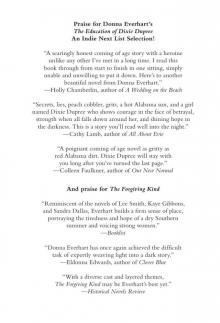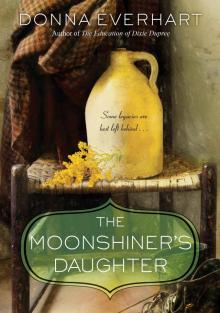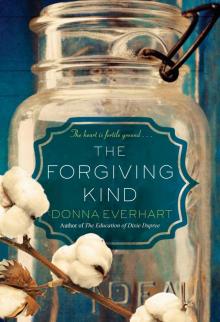- Home
- Donna Everhart
The Forgiving Kind
The Forgiving Kind Read online
PRAISE FOR DONNA EVERHART’S THE EDUCATION OF DIXIE DUPREE
An Indie Next List Selection!
“A searingly honest coming-of-age story with a heroine
unlike any other I’ve met in a long time. I read this book
through from start to finish in one sitting, simply unable
and unwilling to put it down. Here’s to another
beautiful novel from Donna Everhart.”
—Holly Chamberlin, author of Home for the Summer
“Secrets, lies, peach cobbler, grits, a hot Alabama sun,
and a girl named Dixie Dupree who shows courage
in the face of betrayal, strength when all falls down
around her, and shining hope in the darkness. This
is a story you’ll read well into the night.”
—Cathy Lamb, author of The Man She Married
“A poignant coming-of-age novel as gritty as red
Alabama dirt. Dixie Dupree will stay with you
long after you’ve turned the last page.”
—Colleen Faulkner, author of Finding Georgina
Books by Donna Everhart
THE EDUCATION OF DIXIE DUPREE
THE ROAD TO BITTERSWEET
THE FORGIVING KIND
Published by Kensington Publishing Corporation
THE FORGIVING KIND
Donna Everhart
KENSINGTON BOOKS
www.kensingtonbooks.com
All copyrighted material within is Attributor Protected.
Table of Contents
PRAISE FOR DONNA EVERHART’S THE EDUCATION OF DIXIE DUPREE
Also by
Title Page
Copyright Page
Acknowledgments
Epigraph
Chapter 1
Chapter 2
Chapter 3
Chapter 4
Chapter 5
Chapter 6
Chapter 7
Chapter 8
Chapter 9
Chapter 10
Chapter 11
Chapter 12
Chapter 13
Chapter 14
Chapter 15
Chapter 16
Chapter 17
Chapter 18
Chapter 19
Chapter 20
Chapter 21
Chapter 22
Chapter 23
Chapter 24
Chapter 25
Chapter 26
Chapter 27
Chapter 28
Chapter 29
Chapter 30
Chapter 31
Chapter 32
Chapter 33
Chapter 34
Author’s Note
THE FORGIVING KIND
DISCUSSION QUESTIONS
Teaser Chapter
To the extent that the image or images on the cover of this book depict a person or persons, such person or persons are merely models, and are not intended to portray any character or characters featured in the book.
This book is a work of fiction. Names, characters, places, and incidents either are products of the author’s imagination or are used fictitiously. Any resemblance to actual persons, living or dead, events, or locales is entirely coincidental.
KENSINGTON BOOKS are published by
Kensington Publishing Corp.
119 West 40th Street
New York, NY 10018
Copyright © 2019 by Donna Everhart
All rights reserved. No part of this book may be reproduced in any form or by any means without the prior written consent of the Publisher, excepting brief quotes used in reviews.
Kensington and the K logo Reg. U.S. Pat. & TM Off.
ISBN: 978-1-4967-1700-9
ISBN-10: 1-4967-1700-7
eISBN-13: 978-1-4967-1701-6
eISBN-10: 1-4967-1701-5
First Kensington Electronic Edition: February 2019
Acknowledgments
I am fortunate once again to have the opportunity to express my immense gratitude to the following people for their unwavering commitment, encouragement, and support of this latest novel.
To my editor, John Scognamiglio, I am endlessly appreciative of your steadfast guidance, and genuine enthusiasm for these Southern stories I love to write—even if I sometimes write the sort of characters you’d like to punch!
To my agent, John Talbot, thank you all over again for believing in me and my work all those years ago. You took a chance on one singular story, and we haven’t looked back since.
To Vida and Lulu, a virtual standing ovation for what you both individually do. Your passion and commitment as you strive to promote my work goes above and beyond.
To Kris, thank you for all you do on my covers, and to all of the others in my Kensington family who quietly labor behind the scenes, thank you so much for working so hard on my behalf.
A special shout-out to fellow Kensington authors Eldonna Edwards and Mandy Mikulencak, thank you for the gift of your friendships as we celebrate our individual successes.
A heartfelt thank-you to all of the independent bookstores who have helped me build my readership by supporting my work.
Thank you to Jamie Adkins, owner, The Broad Street Deli and Market, for providing the residents of our small town a place to purchase my books locally. (We’re gonna need a bigger shelf.)
A special thank-you to my Trio tribe, Shari Smith, Jana Sasser, Bren McClain, Radney Foster, Cyndi Hoelzle, Eddie Heinzel-man, Billy Coffey, Judith Richards, Deborah Mantella, Daren Wang, Beth Fennelly, Sheryl Parbhoo, and all the rest for your friendship. Attending “Southern literary church” with y’all influenced me to reach for new goals, and to keep growing. I love all of you.
Again, I would like to extend my thanks to book advocates and cheerleaders, Kristy B, Susan Peterson, Susan Roberts, Linda Levack Zagon, and too many others to name here. From the bottom of my heart I appreciate all of you promoting my stories across social media with such heartfelt enthusiasm.
Thank you to each member of my big, loving family, specifically my “moms” who always read my stories first—and of course love them!
And most of all, to my husband. Your quiet, supportive presence is the foundation for my work. Thank you for always reminding me how proud you are, for making sure I eat, and for watching over me. I love you and I couldn’t do this without you.
Forgiveness is the fragrance the violet sheds on the heel that has crushed it.
—Mark Twain
Chapter 1
1955
Daddy never wanted to do nothing much other than grow cotton, and the way he’d gone at it, we figured that would be the thing to kill him, but it wasn’t. We got three hundred acres in Jones County, North Carolina, first-rate land he calls it. For a girl like me, meaning a girl who’d rather spend time outside more than anywhere else, there was no better place on earth. Some might think we’re stuck out in the middle of nowhere, that what we have ain’t no different than any other farm along Highway 58. I see things different—I see what he does. The way freshly plowed soil looks like that rich chocolate powder Mama uses for baking. How the leaves on a cotton plant are heart shaped, and how on a sunny day, their vivid green color gets so intense, you have to squint your eyes. There’s these little buds on the cotton plants, called squares, and when they bloom, they turn pale yellow, like fresh cream. Within days they go to a light pink, and then darker pink, self-pollinating, Daddy says. When our fields turn those different colors, I can’t imagine how nobody wouldn’t think it wasn’t the prettiest sight they’d ever laid eyes on.
In the spring when trees have started to bud out, and flowers reach for the sun, their sweet odor only beginning to drift on the air, we know it won’t be long before cotton-growing seaso
n has come again. The Fort Hill creeping phlox, Virginia spiderwort, and jonquils dare to emerge, while Mama’s Ches-tine Gowdy peonies begin to peek from the ground. Soon, the yard plumb bursts with colors too, always changing, always pretty. I like the hottest months, that time when a shimmery haze appears at the edge of the fields looking like water. In the fall, tiny, fluffy white clouds of cotton come, and we’re in an entirely different world by then, with everything dying off and such. Even the coats of deer and squirrels change, turning mostly gray so they blend with the trees and bushes.
All of us, Daddy, Mama, Ross, Trent, and me, we’re required to work real hard, hitching burlap bags over our shoulders, picking the cotton from dawn to dusk, fast as we can. School allows a break so anyone growing, which is most everybody, can get their fields picked. Afterward, the stalks get plowed under, and the land that was already flat looks even flatter. For instance, I can see a crow land in a tree a mile from our front yard. I can see someone driving down Turtle Pond Road toward our house minutes before they get here. That’s why our little town’s name suits this place. Flatland is where we live.
Our farmhouse is painted snowy white, like the cotton we pick, with a dark green tin roof. It’s split right down the middle by what’s called a dogtrot. The kitchen and living room set off to one side, and the bedrooms and a bathroom are on the other. The two sugar maples at each corner in the front, and a big oak tree in the backyard offer shade from a sweltering summer sun. Our land stops where Turtle Pond Road dead-ends in a thick row of longleaf pines, lined up like a natural fence. Beyond them are woods so dense and thick, during the warm months you can’t see over to Frank Fowler’s place, the only neighbor for miles and miles around. The only other thing visible sets off to the east, the small, silvery shape of the water tower that catches sunlight just so at certain times of the year.
Daddy said I appreciate the land like him, and while Ross is most like Daddy, Trent has got a wild streak long as the entire county. He absolutely hates farming. Daddy said the land’s soaked into me the way blood soaks into wood, a permanent, everlasting mark. Three years ago, when I was nine, he placed an old willow branch in my hands, and showed me how to do what he’s been doing since I can remember, something he calls “divining water.” Turned out I could do this too. Since then, my attachment to the land beneath me has grown even more. I ain’t never forgot how it felt, or how he’d looked either, like a cotton boll ’bout to burst open, all filled up with pride.
It was an early spring morning and as we walked toward a field to start work, we took our time, moseying along the path made by the tractor tires, him with one arm slung round my shoulder, the weight of it natural as my own breath. He pointed at all that surrounded us.
“That’s a mighty fine view, ain’t it, Sonny?”
“Sure is, Daddy.”
The sun painted the edge of the sky like the inside of a peach, all orangey and red. We strolled along, taking in the morning before us. Ross was already at work, listing the dirt into neat, tidy rows. The hum of the tractor in the distance was as familiar and common as spring robins calling for a mate. At sixteen, he was allowed to drive pretty much anything he wanted. Not Trent. At fourteen, he’s old enough, but last week when he was supposed to take one of the tractors to the barn, he got out on the road, and gassed it like he was driving a race car. He ended up in the ditch somehow and after Daddy found out he wasn’t dead, he was ticked off but good. Trent was told he’d have to use money out of his allowance each week to pay off what it cost for repairs. Daddy said he could also forget climbing on anything with a motor until he straightened up and earned the right again. At twelve, I’m considered old enough to drive the tractors too, but I prefer the quiet of working with a hoe, which Trent said was dumb.
Daddy dropped his arm off my shoulder.
He looked to his left, toward Trent already at work without being told. “I see he’s still thinking he can persuade me to change my mind.”
He grinned down at me before he took off to check the fields we’d done the day before. I grabbed a hoe leaning against the fence, and went to work on the early nutsedge and morning glories. The work was something I could do while allowing my thoughts to drift as unpredictable as a dandelion pod caught by a breeze. I thought about Daniel Lassiter. Daniel has always been a head shorter than me until this past year when he’d abruptly shot up fast as a cornstalk. His family lives directly in Flatland, city folk we consider them, though our town’s not much of a city. He likes to come here ’cause we got us a stage of sorts set up in one of the old barns. Daniel fancies himself a director, says he’s going to make us movie stars one day. That, or he said he’d be a scientist.
Trent’s voice interrupted my daydreaming. “Sonny, geez, hurry it up!”
Gosh, he was almost at the end of his row whereas I was only halfway. I didn’t want to hear him gripe, so I chopped good and fast. From where we worked, I had a perfect view of Daddy, moving along parallel to us, his hair shining like pale gold. We had the same hair color, his eye color too, a clear green Mama said looked like new shoots of grass.
Whenever we were at Wells’ Grocery or Slater’s Supplies, someone would inevitably say, “Sakes alive, if you Creech kids ain’t the spitting image of Lloyd.”
My arms were burning by the time I caught up to Trent and I took a minute to stretch my back muscles. We’d plant soon as it was warm enough, and this was the last field to get ready.
I was already in the process of starting again when Trent, his voice cracking like it had been doing lately, said, “Sonny, get a move on, Ross is almost done!”
I didn’t even bother to look up. “I ain’t in no race with you.”
“Just hurry it up.”
I mimicked him under my breath, glancing toward Daddy. He was so far away, he looked like a tiny baby doll. He bent down, but it was what happened next that caught my attention. He stumbled backward, the way you would when you found a root, and pulled harder than necessary to get it loose. He lifted his arm over his head and brought it down quick, an odd movement, as if he’d tossed something away. I shaded my eyes. Daddy was looking right at me. I waited to see if he’d go back to work. Something about the way he stood so still wasn’t right. He never wasted time just standing around. He was always on the go, in constant motion, sunup to sundown.
I leaned the hoe handle against my shoulder, cupped my hands around my mouth and yelled, “Daddy? Everything all right?”
The question in my voice got Trent’s attention. Daddy didn’t wave, or acknowledge me. He looked like a scarecrow standing there. I started across the field, still not sure there was anything wrong until he went down to his hands and knees, his overalls and T-shirt creating a blue and white lump in the middle of all that brown dirt. I kept thinking he’d stand up again ’cause he was strong, never sick a day in his life. I was confused, and when he didn’t rise, a shivering kind a chill shot down my back and I started running, the soft, freshly turned soil making it hard to gain speed. I tripped, stumbling over the rows in an awkward manner, as if my leg muscles weren’t getting the proper signals from my brain. I couldn’t breathe, and the air was suddenly thick with heavily scented, overturned soil.
I yelled as I ran. “Daddy?”
Seconds later Trent passed me, his overalls stained dark with sweat, face already tanned almost the same color as the straw hat clamped on his head. Behind us the tractor shut off.
Ross’s voice was faint as he yelled, “What’s wrong?”
My hat slid off, fell to the ground, and my braid slapped against my back as I ran. It felt like it took forever to get to him when it only took seconds. Daddy lay balled up on his side, face contorted, his breath whistling in and out like a tire with a hole in it. Trent and I dropped to our knees in the warm, loamy soil. Daddy’s hands clenched tight around the handle of his hoe, and he groaned. There was a trace of blood on his lip, like he’d bit it. One of his legs tremored, knocking against the ground, a spastic, foreign movement that was scar
y to see. Seconds later, Ross dropped down beside me and Trent.
I said, “Daddy? What is it?”
Ross swiped at Daddy’s face with the tail of his T-shirt to wipe the sweat away. Daddy held his arm up. We looked. We saw, and understood. I put my hand over my mouth, covering the O shape of shock. Daddy’s arm had two deep puncture wounds, and his forearm was already puffing up. Trent pointed at a long brown thing, not hardly fifteen feet away.
He said, “Rattler.”
The snake squirmed, its body twisting and coiling, then uncoiling before slithering along a trench made by the tractor.
Trent jumped up like he would go after the snake, and Ross said, “No! Leave it. We got to get Daddy to the house.”
The sun burned too hot right then, as if it would sear our backs as we stared down at the man we’d only ever seen upright unless he was sleeping in the bed or sitting at the kitchen table eating. Ross and Trent got on either side of him and helped him stand.
Daddy gasped, “Don’t know why I didn’t see him. Bent . . .” He stopped to pant through the pain, then continued, “Down . . . to pick . . . up rock. There he was.”
Ross turned to me. “Sonny, go tell Mama to call the doc. We’ll get him to the house quick as we can.”
Holding back tears, I took off for the house running hard as I could go, stumbling back the way I’d come, across the neatly laid rows, the tracks I left as erratic as the path of a small tornado. We’d left Mama tending to early English peas in the kitchen garden. She wore a pair of Daddy’s work pants, cinched with a belt at the waist, and cut off at the bottom so they wouldn’t be too long. Daddy had only joked this morning about how they looked like clown pants.

 The Moonshiner's Daughter (ARC)
The Moonshiner's Daughter (ARC) The Moonshiner's Daughter
The Moonshiner's Daughter The Forgiving Kind
The Forgiving Kind The Road to Bittersweet
The Road to Bittersweet